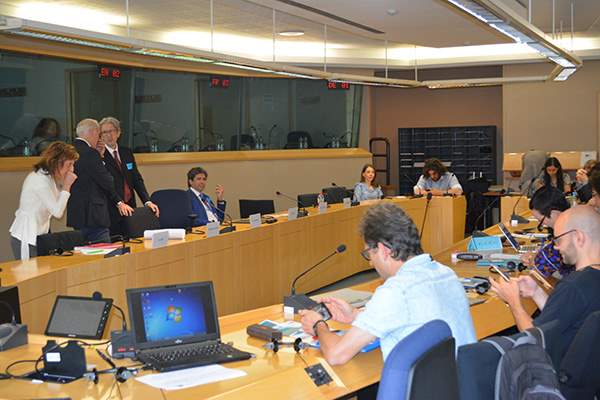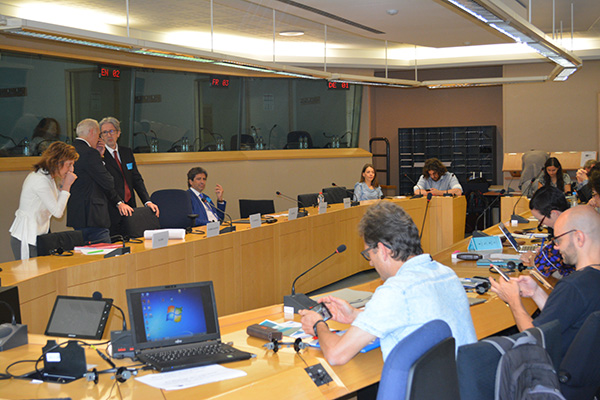
Findings from MATES project presented in Brussels

Brussels hosted the closing conference within the MATES (Multi-Agency Training Strategies for Radicalised Youth) project that has been carried since 2016 by researchers from six European countries. The conference topic was prevention of radicalisation of youth.
The research in the area of Slovenia and Western Balkan was carried out by Alma Mater Europaea – ECM, by dr. Damir Črnčec and dr. Goran Gumze. Participants discussed a multi-institutional approach and training of radicalised youth, and their re-socialization. The state secretary of the Ministry of the Interior, mag. Boštjan Šefic, also participated at the conference.
As stated during the speech, it is important that all stakeholders in this field direct their efforts to preventive action and to deradicalization of those who have been already radicalized due to special circumstances. Šefic said that Slovenia supports such projects and that such cooperation should be upgraded and developed.
Terrorism is today a very dynamic and very complex phenomenon and remains one of the greatest threats to global, regional and national security. More than ever before, it exploits the technological development and benefits of the values of democracy, the rule of law and freedom. We must not forget that in addition to religiously supported terrorism, we are faced with other, ideologically supported extremism and terrorism. To effectively counter the threat of terrorism and radicalism at global, regional and national level, a comprehensive concept must be put in place, which must be focused on prevention and limitation. In this respect, the police and intelligence segment are important, with new responsibilities being at the forefront of education, social affairs, health, justice, culture ... According to Šefic, a greater role should be given to young people and the media, which can make a significant contribution to preventing radicalization and terrorism.
"Due to the complexity of new risks, we must be able to create a system that will enable timely identification of factors in society and in the local environment, which influence the emergence of a favourable environment for the development of violent radicalization, attracting the most vulnerable individuals and groups, which targets especially the young people. We need to develop a horizontal approach based on the close cooperation of all those who can contribute to a better understanding, recognition, detection, prevention, investigation, as well as to the possible reintegration or resocialization of persons who have fallen behind in extremism or terrorism. In this context, intensified inter-agency and cross-sectoral cooperation should continue, "said Šefic.
Slovenia has transferred the practices developed within the EU RAN, Center of Excellence to the national level and adapted them to specific local challenges with help of specific expertise. It's a fact, that the number of radical groups and individuals is manageable and compared to some other countries at an enviably low level. Similarly to other EU Member States, Slovenia also focuses heavily on the understanding of the factors and reasons that influence the process of radicalization, as well as the opportunities for deterrence and re-socialization.
Based on the positive results of the establishment of the national RAN platform and the conclusions of the Ministerial Meeting of the Brdo Process in 2014, the RAN approach has also been transferred to the Western Balkan countries through the project “FIRST LINE – direct contractors who are faced with the issue of violent radicalization - Raising awareness and promoting capacity building in the region of the Western Balkans. " By presenting the legal framework and the transfer of knowledge and best practices in the EU countries, we helped the countries of the Western Balkans to establish appropriate conditions for the independent identification of key threats, challenges, influences and opportunities.
Given the complexity of the phenomenon of radicalization, especially taking into account the fact that at present the greatest security risk is represented by Daesh fighters and returnees and related members of radical Islamic groups living in Europe following the calls by terrorist groups to carry out attacks on European soil, we will continue to dedicate our work to this particular area in the future as well. Particular attention should be paid to younger populations and minors. The participants agreed that our actions should be directed towards preventing radicalization and creating conditions for social integration; the role of academic institutions in this task is extremely important. Alma Mater Europaea ECM has applied to the European Commission's calls for two related projects focused on preventing radicalization and terrorism with this same international consortium.
In the future, these challenges will require us to further integrate, share knowledge, information, experience and good practices and integrate the widest range of potential stakeholders. Only in this way will we be able to properly identify the risks and ensure the timely, proactive action of all relevant actors, with the goal of peaceful coexistence in a modern society.
